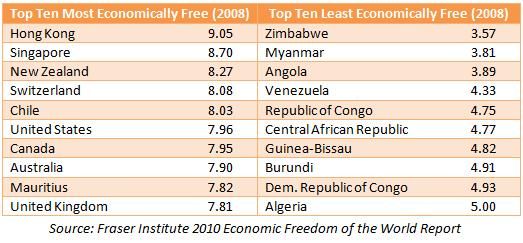Is the Recession Killing Economic Freedom?

The 2010 Economic Freedom of the World report, released annually by the Fraser Institute, shows that world economic freedom declined between 2007 and 2008, the most recent year for which data is available. The United States also lagged, showing a decline in economic freedom driven by an increase in the size of government.
In 2008, economic freedom dropped to a score of 6.67 – this being the first year where global average economic freedom has dropped since the beginning of the study in 1980. Indeed, economic freedom in the world had increased steadily between 1980 (5.53) and 2007 (6.74).
“It’s pretty clearly the great recession, and governments intervening more deeply in the economy than they did before,” said McMahon, explaining the global decrease in economic freedom. “Our data is the most recent available, which is 2008. We anticipate that as we get more recent data, we’ll see a further decline [in economic freedom].”
On the other hand, McMahon argued that the global economic response has been rather sensible, considering all the options:
Market oriented countries have resisted the siren call of protectionism, and with some exception, resisted really back-breaking stimulus. In fact, what you see in the United Kingdom is very significant cutbacks even while the recession is still going on. From a policy point of view, we have well resisted huge setbacks in economic freedom.
In the United States, world freedom declined from a score of 8.08 in 2007, to 7.93 in 2008, ranking the country 6th in the world. “[The U.S.] was hitting rocky waters before the last quarter of 2008, and you’ve got to remember that when you look at the figures you see only an extremely small decline,” said McMahon. “We will see a larger dip when we get the 2009 data… it’s possible the U.S. could drop out of the top ten.”
The United States’ drop in economic freedom from 2007 to 2008 had largely come from an increase in governmental consumption, as well as transfers and subsidies.
Although some of the worst of the economic crisis was to come in 2009, McMahon points out that, even in 2008, governments were spending more because of ‘automatic stabilizers’ – expenses that increase during times of economic distress, even as government policy remains the same. Automatic stabilizers include government expenditures like welfare and unemployment insurance. TARP funding, which began in late 2008, can also be considered a factor.
The Heritage Foundation received a significant amount of press when it earlier released its own 2010 Index of Economic Freedom, which dropped the United States from ‘Free’ to ‘Mostly Free’. McMahon said that the data is simply not there to support that assertion, arguing that much of the information required to make calculations on economic freedom in 2010 isn’t yet available.
“There’s no data to support it either way,” McMahon said. “They use some hard data… but I don’t know where they get that [the United States is only ‘mostly free’]… at the end of the day, their ranking is subjective, not based on hard calculations on hard data.”
Tweet
Add Tim on twitter: www.twitter.com/timkmak


